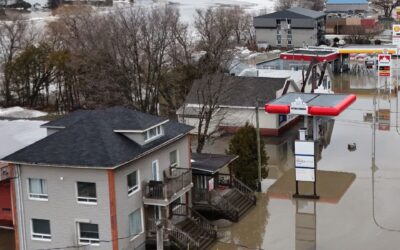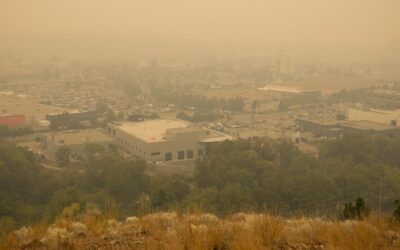This opinion piece originally ran in the Toronto Star.
What comes to mind when you think about the costs of climate change?
Is it parched fields or unprecedented heat waves? A wildfire sweeping through a town in B.C. or Alberta? A house swallowed by a swollen river in Manitoba or Quebec?
These events are devastating and memorable—and yes, they represent some of the costs of climate change that Canada is already paying for.
But climate change isn’t just about isolated extreme weather events. It isn’t about costs to somebody else, somewhere else, sometime in the future. The costs of climate change are already here today, they’re already driving up the cost of living for Canadians, and they’ll escalate dramatically in the years to come.
Climate change is reaching into your wallet in hundreds of ways, from higher grocery bills due to supply-chain disruption, to soaring insurance premiums on your home and cottage, to the inevitable tax hikes to pay for climate damage and climate-proofing infrastructure.
That’s the major takeaway from our new report: climate change impacts are a present and growing drag on the economy, pulling down GDP, depressing investment and exports, and killing jobs—and Canadians will bear the brunt of those costs. Households face a double whammy: climate change pushing up expenses while economic opportunities evaporate due to slower growth.
For more than three years, the Canadian Climate Institute has been researching the costs of climate change, and that research has culminated in Damage Control: Reducing the Costs of Climate Impacts in Canada. We ran 84 different scenarios, among them two separate global-emissions scenarios and a range of plausible climate change impacts in Canada, and tested the results through an expert review process to reveal the most detailed picture yet of what climate change is doing to the Canadian economy.
Maybe the most important finding is this: climate change is no longer a distant threat; it’s here today, and it’s doing real damage to Canada’s economy. Our research shows that as soon as 2025 — just over two years from now — climate-induced damages will be slowing Canada’s economic growth to the tune of $25 billion annually, equal to about half the expected annual growth in our economy. Beyond 2025, the damages will escalate, potentially wiping out half a million jobs by 2050 and almost 3 million jobs by end of century.
Fortunately, Canada is not powerless before this threat. Our research shows that proactive adaptation measures to protect Canadians can cut the costs of climate change in half. Canada needs to quickly scale up our adaptation and investment strategies to match the scale of the risk we’re facing, starting with the forthcoming National Adaptation Strategy. For too long, Canada’s response has failed to match the magnitude of the climate threat.
Investing in adaptation is a no-brainer. A dollar invested today in adaptation measures will return $15: $5 in direct benefits, like reducing the cost of repairing damaged infrastructure, and $10 of indirect benefits, such as avoiding the costs of supply-chain disruptions and maintaining labour productivity.
Obviously, limiting further climate destabilization needs to be a priority as well. If Canada and other countries are able to successfully reduce emissions in line with their targets on top of proactive adaptation here at home, Damage Control finds that future climate damage to our economy and reduction to our GDP could be reduced by three-quarters.
For years, we’ve collectively underestimated the costs of climate change inaction and undervalued the benefits of mitigation and adaptation. Inaction, it turns out, is eye-wateringly expensive.
Climate change impacts don’t just show up as catastrophic losses, like the loss of your house to a flood or a fire. They will increasingly start to show up as the red ink on your bank balance, the loss of a job, the decline in the value of your retirement nest egg, and the stress of expenses piling up while earnings slow.
Climate change costs. But we have an opportunity to act now, and slash the bill by up to 75 per cent before it fully comes due.








